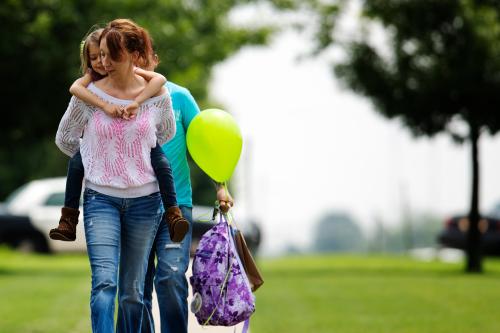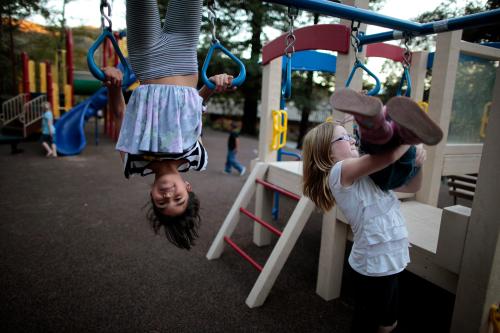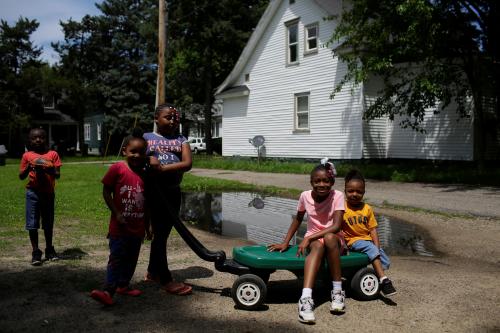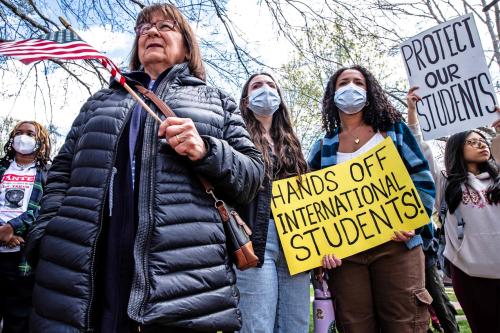Kathy Hirsh-Pasek, senior fellow in the Global Economy and Development program and Center for Universal Education at Brookings submitted this statement on behalf of the Scientific Advisory Group, Early Childhood of the Bezos Family Foundation, of which she is a member. Other signatories include: J. Lawrence Aber, New York University; Jackie Bezos, Bezos Family Foundation; Clancy B. Blair, New York University; Laurie M. Brotman, NYU Langone Health; Adele Diamond, University of British Columbia; Anne Fernald, Stanford University; Ellen Galinsky, Bezos Family Foundation; Alison Gopnik, University of California, Berkeley; Megan Gunnar, University of Minnesota; Patricia K. Kuhl, University of Washington; Megan McClelland, Oregon State University; Andrew N. Meltzoff, University of Washington; Jack P. Shonkoff, Harvard University; Philip David Zelazo, University of Minnesota.
In February, UNICEF reported that there were over 12 million children worldwide living as refugees and asylum seekers, and another 16 million displaced in their own countries due to war and conflict. In the U.S., we have over 2,000 migrant, refugee, and asylum-seeking children at our southern border who were taken from their parents and warehoused alone—though there are plans now to warehouse them on military bases with their parents. The trauma that many of these parents and children are experiencing on American soil threatens to undermine their future development via the impact of toxic stress. As concerned scientists who study the impact of toxic stress, trauma, and resilience in children and families, we know that the cost to our societies can be enormously high. It is imperative that the global community responds and takes action to help babies and children who are too young to ask for help themselves.
When traumatic experiences are imposed on young children, the impact on their bodies and brains can last a lifetime, even if those children cannot consciously remember the events that terrified them. When children are in stressful environments, they, like adults, become anxious and frightened. Hormones and brain chemicals associated with stress change the brain in ways that affect how the individual functions socially, emotionally, and intellectually. It even affects the way a person’s immune system functions.
This stress makes the amygdala, the hub of the fight or flight response, activate more strongly. It impairs the ability of the brain’s prefrontal cortex to calm down the amygdala. It also impairs brain circuits that allow us to control our own behavior so that we can avoid distractions and temptations. Furthermore, stress increases the chances we will seek those temptations, because it reduces the brain’s ability to experience reward, so that we need stronger stimulation for us to feel good. Finally, prolonged stress produces an immune system that acts like the person is always mildly infected and/or that the person can have trouble fighting off infections or killing rogue cancer cells. The longer these stressful situations last, they more they become built into the architecture of children’s brains, which is why we call it “toxic stress.”
The biology of attachment produces strong emotions too: the joy of being together and the terror of being forcibly separated. Attachment is activated when children are sick, frightened or in strange, uncertain situations. In such situations, young children typically become wholly focused on getting back to mom or dad, and if they cannot do so, their bodies are flooded with the hormones and brain chemicals of stress. Even short-term separations can be traumatic if they are sudden, unexpected, terrifying, and the child is not provided with other familiar adults who can provide comfort.
If and when the more than 2,000 children who have been separated from their parents at the U.S. southern border are reunited, and if and when the refugees find safe places to go, the toxic stress won’t simply dissipate without attention and care for both the children and the parents. In the U.S., we will often be handing traumatized children back to traumatized parents, particularly since many families—prior to separation—experienced grave trauma at home and on the journey to the border. Similarly, the tens of thousands of families displaced by war and chaos have experienced grueling circumstances before becoming refugees. Children and their parents will struggle with very strong emotions, confused by what happened to them and terrified of what might happen in the future.
While some children will suffer a lifetime from these types of childhood traumas, others can and will recover, even thrive. After decades of study, the outline of what helps children to be resilient to trauma is becoming clear. First and foremost is the support and care of an adult who is mentally and physically able to function. Trauma affects parents too and handing a traumatized child to a traumatized parent is a risk to both of their functioning. Mental health services for the parents and children and living conditions that allow families to function are proven conditions to support child resilience, increasing the chances they will grow up to be socially competent, self-reliant, to have self-control and succeed in school. For adolescents, interventions that help the adolescent understand stress and learn skills to cope, in the context of close relationships with supportive adult coaches, have been found to be effective.
The migrants at our border and the refugees in other parts of the world cannot be seen as tragic but fleeting moments in our global history. We must work to repair the damage that toxic stress has caused. It is possible to undo many of the biological and psychological consequences of stress but action is needed quickly and requires a global response.
The Brookings Institution is committed to quality, independence, and impact.
We are supported by a diverse array of funders. In line with our values and policies, each Brookings publication represents the sole views of its author(s).








Commentary
The enormous cost of toxic stress: Repairing damage to refugee and separated children
July 9, 2018